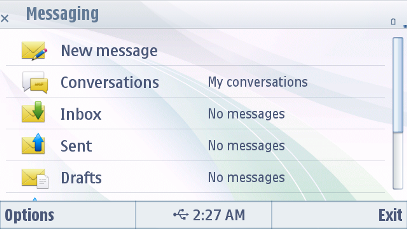List layouts
List items can in general be more complex (contain more elements) than grid items. Certain layout rules apply to all lists:
All items in a list have equal height on the screen (forms do not follow this rule in the Edit state, see Forms).
The column structure of all items in a list must be similar. It is not possible to combine e.g. single-column items to a three-column item list (however, it is possible to use some different item types having the same general appearance), see Column structure of lists for columns.
Partial items are not visible: when the list/grid pane area does not exactly correspond to an integer number of items, the remaining area outside the last fully visible item appears empty, displaying the background of the particular pane.
In landscape layout, all two row lists can be stretched to be displayed in one row. This enables displaying more items in the list. In list stretching, the second row is moved next to the first row. List stretching is ON by default, but application can decide to disable it.

Figure: Two row list in stretched mode in landscape layout
Using list layouts in applications
The API to use for lists is the Lists API. For implementation information, see Using the Lists API.
For grids, the APIs to use are the Grids API and the Lists API. For implementation information, see Using the Grids API and Using the Lists API.
- Column structure of lists
- Item type combinations
- List item types
- List
stretchList stretching is commonly used in lists (that have two lines) viewed in landscape mode.
- Numbered items